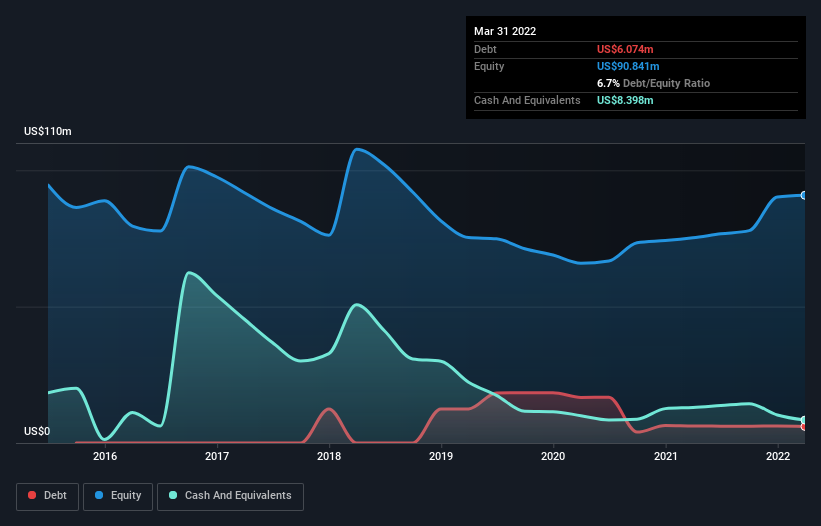Warren Buffett famously said, 'Volatility is far from synonymous with risk.' So it might be obvious that you need to consider debt, when you think about how risky any given stock is, because too much debt can sink a company. We note that Gaia, Inc. (NASDAQ:GAIA) does have debt on its balance sheet. But should shareholders be worried about its use of debt?
Why Does Debt Bring Risk?
Generally speaking, debt only becomes a real problem when a company can't easily pay it off, either by raising capital or with its own cash flow. If things get really bad, the lenders can take control of the business. While that is not too common, we often do see indebted companies permanently diluting shareholders because lenders force them to raise capital at a distressed price. Of course, plenty of companies use debt to fund growth, without any negative consequences. When we examine debt levels, we first consider both cash and debt levels, together.
View our latest analysis for Gaia
What Is Gaia's Debt?
The chart below, which you can click on for greater detail, shows that Gaia had US$6.07m in debt in March 2022; about the same as the year before. But it also has US$8.40m in cash to offset that, meaning it has US$2.32m net cash.

How Healthy Is Gaia's Balance Sheet?
Zooming in on the latest balance sheet data, we can see that Gaia had liabilities of US$28.5m due within 12 months and liabilities of US$13.4m due beyond that. Offsetting this, it had US$8.40m in cash and US$2.90m in receivables that were due within 12 months. So it has liabilities totalling US$30.6m more than its cash and near-term receivables, combined.
This deficit isn't so bad because Gaia is worth US$90.0m, and thus could probably raise enough capital to shore up its balance sheet, if the need arose. But it's clear that we should definitely closely examine whether it can manage its debt without dilution. Despite its noteworthy liabilities, Gaia boasts net cash, so it's fair to say it does not have a heavy debt load!
Although Gaia made a loss at the EBIT level, last year, it was also good to see that it generated US$2.3m in EBIT over the last twelve months. The balance sheet is clearly the area to focus on when you are analysing debt. But ultimately the future profitability of the business will decide if Gaia can strengthen its balance sheet over time. So if you want to see what the professionals think, you might find this free report on analyst profit forecasts to be interesting.
But our final consideration is also important, because a company cannot pay debt with paper profits; it needs cold hard cash. While Gaia has net cash on its balance sheet, it's still worth taking a look at its ability to convert earnings before interest and tax (EBIT) to free cash flow, to help us understand how quickly it is building (or eroding) that cash balance. During the last year, Gaia generated free cash flow amounting to a very robust 94% of its EBIT, more than we'd expect. That positions it well to pay down debt if desirable to do so.
Summing up
While Gaia does have more liabilities than liquid assets, it also has net cash of US$2.32m. The cherry on top was that in converted 94% of that EBIT to free cash flow, bringing in US$2.1m. So we don't have any problem with Gaia's use of debt. There's no doubt that we learn most about debt from the balance sheet. But ultimately, every company can contain risks that exist outside of the balance sheet. We've identified 4 warning signs with Gaia , and understanding them should be part of your investment process.
If you're interested in investing in businesses that can grow profits without the burden of debt, then check out this free list of growing businesses that have net cash on the balance sheet.
New: Manage All Your Stock Portfolios in One Place
We've created the ultimate portfolio companion for stock investors, and it's free.
• Connect an unlimited number of Portfolios and see your total in one currency
• Be alerted to new Warning Signs or Risks via email or mobile
• Track the Fair Value of your stocks
Have feedback on this article? Concerned about the content? Get in touch with us directly. Alternatively, email editorial-team (at) simplywallst.com.
This article by Simply Wall St is general in nature. We provide commentary based on historical data and analyst forecasts only using an unbiased methodology and our articles are not intended to be financial advice. It does not constitute a recommendation to buy or sell any stock, and does not take account of your objectives, or your financial situation. We aim to bring you long-term focused analysis driven by fundamental data. Note that our analysis may not factor in the latest price-sensitive company announcements or qualitative material. Simply Wall St has no position in any stocks mentioned.
About NasdaqGM:GAIA
Gaia
Operates a digital video subscription service and online community for underserved member base in the United States, Canada, Australia, and internationally.
Excellent balance sheet with reasonable growth potential.
Similar Companies
Market Insights
Community Narratives



